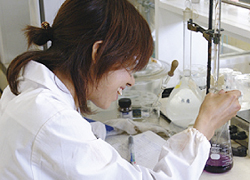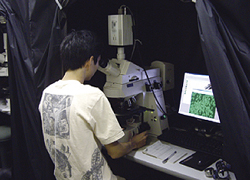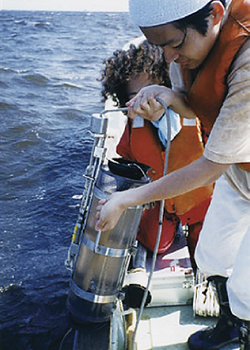Overview

The Faculty of Science is a place for education and research on science. Science is a study that engages in a “dialogue with Nature” to understand the principles and laws working in the natural world. We strive to unravel the mysteries of nature, starting by asking simple questions such as “Why?” and “How?” The principal incentives to do most research activities lie in pure interest, and human wisdom has been accumulated in this manner for many generations. Sometimes the understanding of Nature directly results in applied use in the real world. Other times, it takes a long time before the understanding of Nature brings a significant change to our lifestyles.
Take quantum mechanics, which describes microworlds, for example. The starting point of quantum mechanics was the pursuit of pure interest, such as “What structures does an atom have?” and “What is the true nature of light?” This pure interest led to the understanding of the behavior of electrons in a substance, which resulted in the establishment of semiconductor technology. Semiconductor technology, in turn, resulted in the birth of computer technology, which leads to the creation of the modern information society. Also, quantum mechanics has enabled the development of a variety of functional substances, based on the discovery of the true nature of chemical bonds and the microscopic understanding of molecular structures and chemical reactions. We are surrounded by materials that are manufactured with those functional substances. The concept of molecular structures, meanwhile, has been extended to include organisms. Triggered by the discovery of double helix of DNA, the dramatic development of biotechnology took place. Without research in the field of science, many convenient functions, which we enjoy in the modern world, would not have been brought about.
Take quantum mechanics, which describes microworlds, for example. The starting point of quantum mechanics was the pursuit of pure interest, such as “What structures does an atom have?” and “What is the true nature of light?” This pure interest led to the understanding of the behavior of electrons in a substance, which resulted in the establishment of semiconductor technology. Semiconductor technology, in turn, resulted in the birth of computer technology, which leads to the creation of the modern information society. Also, quantum mechanics has enabled the development of a variety of functional substances, based on the discovery of the true nature of chemical bonds and the microscopic understanding of molecular structures and chemical reactions. We are surrounded by materials that are manufactured with those functional substances. The concept of molecular structures, meanwhile, has been extended to include organisms. Triggered by the discovery of double helix of DNA, the dramatic development of biotechnology took place. Without research in the field of science, many convenient functions, which we enjoy in the modern world, would not have been brought about.

Science can be a base block for applied science, but this is not only reason why science is important. The understanding of Nature forms a basis for our concepts of nature and the universe. Science teaches us how much it is important for humans to coexist with nature. In addition, science sometimes gives us wisdom to cope with the fury of nature. One could say that through these channels, science contributes to the safety of society and to peace of mind. In this way, science is the most fundamental building block of culture that humans have accumulated for generations. In other words, the development of science brings about the refinement of our perspective on nature and encourages us to open the future.
The Faculty of Science has ten departments: mathematics, information science, physics, astronomy, earth and planetary physics, earth and planetary environmental science, chemistry, biophysics and biochemistry, biological sciences, and bioinformatics and systems biology. More than 90% of our undergraduate students continue their study at a graduate school (including that of other universities or of other fields). Our students are expected to master more advanced knowledge in their fields of specialty through actual research and to be active players in various fields, including researchers who work at universities, government agencies or companies. Of course, a certain portion of undergraduate students join companies or government agencies right after graduation.
What are the true characteristics of dark matter that accounts for the large part of a mass in the universe? What causes El Nino? What processes does the brain use to retain memory? There are a lot of things in the natural world that are above human comprehension. Those who want to study at the Faculty of Science are requested to have high aspirations to “tackle the mysteries of nature.” They are also asked to acquire strong abilities to solve these mysteries while learning principles and rules governing nature that are already known. In doing so, Nature will surely inspire you a lot.
The Faculty of Science has ten departments: mathematics, information science, physics, astronomy, earth and planetary physics, earth and planetary environmental science, chemistry, biophysics and biochemistry, biological sciences, and bioinformatics and systems biology. More than 90% of our undergraduate students continue their study at a graduate school (including that of other universities or of other fields). Our students are expected to master more advanced knowledge in their fields of specialty through actual research and to be active players in various fields, including researchers who work at universities, government agencies or companies. Of course, a certain portion of undergraduate students join companies or government agencies right after graduation.
What are the true characteristics of dark matter that accounts for the large part of a mass in the universe? What causes El Nino? What processes does the brain use to retain memory? There are a lot of things in the natural world that are above human comprehension. Those who want to study at the Faculty of Science are requested to have high aspirations to “tackle the mysteries of nature.” They are also asked to acquire strong abilities to solve these mysteries while learning principles and rules governing nature that are already known. In doing so, Nature will surely inspire you a lot.
Departments

Department of Mathematics
Department of Information Science
Department of Physics
Department of Astronomy
Department of Earth and Planetary Physics
Department of Earth and Planetary Environmental Science
Department of Chemistry
Department of Biophysics and Biochemistry
Department of Biological Sciences
Department of Bioinformatics and Systems Biology
Department of Information Science
Department of Physics
Department of Astronomy
Department of Earth and Planetary Physics
Department of Earth and Planetary Environmental Science
Department of Chemistry
Department of Biophysics and Biochemistry
Department of Biological Sciences
Department of Bioinformatics and Systems Biology
Type of Degree
Bachelor of Science
Contact

Academic Affairs Section, Administration Department: kyoumu.s AT gs.mail.u-tokyo.ac.jp
International Team: intl.s AT gs.mail.u-tokyo.ac.jp
International Team: intl.s AT gs.mail.u-tokyo.ac.jp






